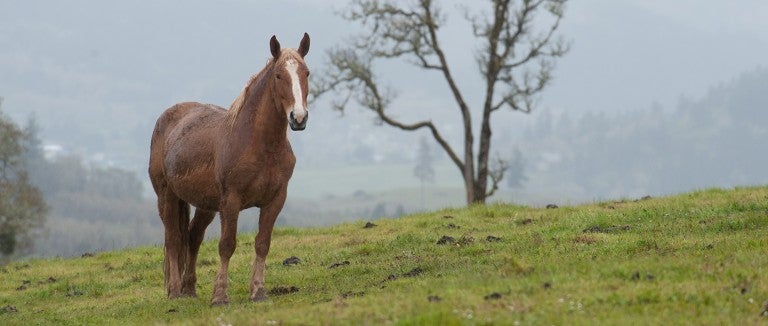To thrive, horses require healthy amounts of food and water, adequate shelter and competent care. Horse owners must commit a great deal of time, energy, skill and money to ensuring their horses have everything they need to live a happy, healthy life of thirty years or more.
Any time a horse changes hands, he is at risk of being sold for slaughter. Local livestock auctions are frequented by middlemen who are looking to purchase young, healthy horses for foreign owned slaughter plants.
If, as a horse owner, you decide you can no longer care for your horse, you should not take her to a livestock auction. Instead, you should take advantage of a variety of humane options available to you.
1. Sell your horse to a properly vetted, private owner
In order to have a successful relationship, horses and owners must be matched by temperament and ability. By selling your horse to a carefully screened private owner you can ensure your horse and his owner are a good match. A buy-back clause in the contract will give you right of first refusal should the new owner ever decide to sell but requires that you maintain contact with the owner, sometimes for years.
2. Lease your horse to another horse enthusiast
Leasing involves giving someone else access to your horse for riding and companionship for a set period of time. A typical lease involves the lessee paying a portion of the horse's monthly expenses in exchange for a certain number of days where she can ride or otherwise spend time with the horse. Leasing can relieve some of your time and financial commitments to horse ownership without giving up ownership of your horse.
3. Relinquish your horse to a therapeutic riding center, park police unit or similar program
Hundreds of organizations across the country accept relinquished horses. Therapeutic riding centers, mounted police units and university riding programs all accept relinquished horses. Use the same careful consideration you would in choosing any home for your horse. Be sure to find out what policies the organization has in place for horses who are retired or are no longer suitable for the program.
4. Contact your horse's breeder or previous owners
Many registries require transfers of horse ownership be documented through them—usually with the ownership history listed on the horse’s registration papers. One exception is The Jockey Club, which only lists the breeder on thoroughbreds’ papers. You can discover thoroughbreds’ previous owners by searching their race records on websites such as equibase.com. Some breeds also maintain databases for owners who want to be contacted if a horse they’ve owned or bred needs a home. Three examples are AQHA’s Full Circle program, USTA’s Full Circle program, and The Jockey Club’s Thoroughbred Connect program.
5. Relinquish your horse to a horse rescue or sanctuary
Hundreds of U.S. horse rescues and sanctuaries take in horses with the intention of adopting them out to new homes. Sanctuaries provide a lifetime home for horses. If you relinquish your horse to a horse rescue or sanctuary be sure it is a legitimate, well-run organization that is able to properly care for your horse. You can use the HSUS/AWI Guidelines for Operating a Horse Rescue or Retirement Facility (PDF) to help you evaluate a potential facility.
6. Consider humane euthanasia
If your horse has become incapacitated and cannot recover, humane euthanasia by a licensed veterinarian is your best option. The cost of humane euthanasia and carcass removal is equal to or less than one month's care in most parts of the country and is part of responsible horse ownership. You should plan and budget for this expense—if you can't afford to euthanize your horse when the time comes, you cannot afford a horse and should not be a horse owner. Please see Humane Horse Remains Disposal Options for your state.
